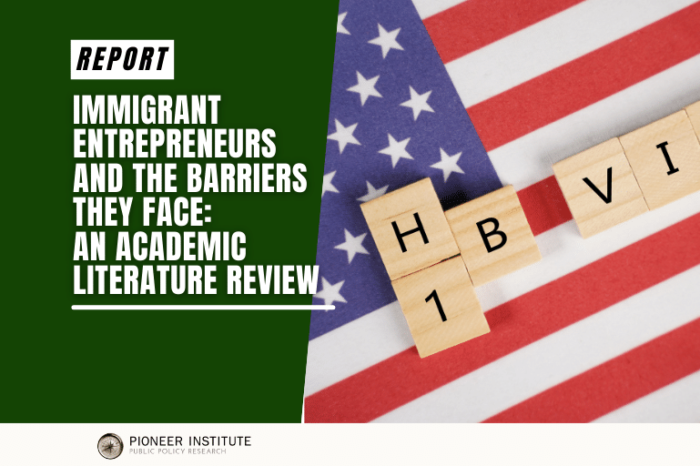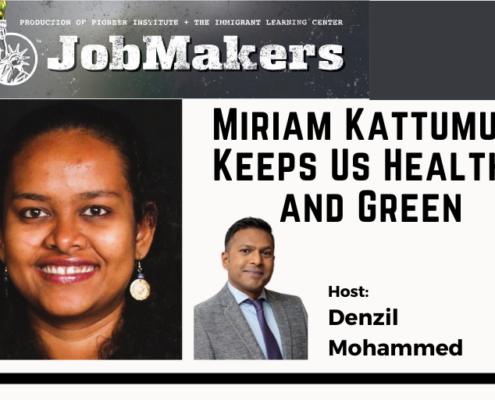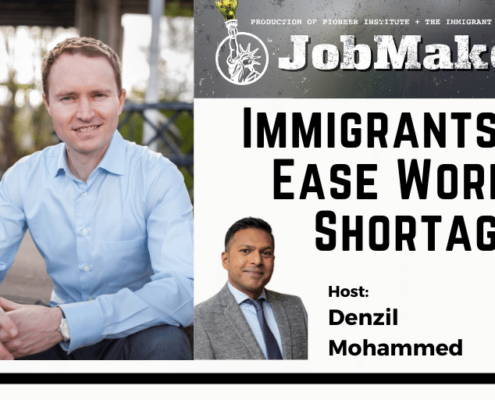Report: Immigrant Entrepreneurs Provide Economic Benefits, but Face Significant Obstacles
More likely to start innovative businesses, but getting into the U.S. is increasingly difficult
BOSTON – Immigrants have started a quarter of all businesses in Massachusetts despite making up just 17 percent of the state workforce, and those establishments appear to be more innovative than those founded by native-born Americans. Despite these contributions, shrinking federal visa caps and red tape are among the factors making it more difficult for immigrants to come to the U.S., according to “Immigrant Entrepreneurs and the Barriers They Face: An Academic Literature Review,” published by Pioneer Institute.
The innovative nature of these businesses is demonstrated by the fact that establishments with at least one immigrant founder are 35 percent more likely to hold a patent than those without an immigrant founder.
“Immigrant entrepreneurs contribute more than their share to the prosperity Massachusetts has enjoyed in recent years,” said Pioneer Executive Director Jim Stergios. “They prove every day that the American Dream is alive and well.”
Many immigrant entrepreneurs who came to this country with little money or education thrive, but their highly educated counterparts are also critical. Massachusetts is second among the states in the number of international college students per capita. Twenty-five foreign-born graduates of the Commonwealth’s colleges and universities have founded unicorn companies (private start-ups worth $1 billion or more).
But the number of international students in the U.S. has fallen every year since 2016. The pandemic certainly played a role in the recent decreases, but 60 percent of respondents to a 2019 Institute of International Education survey said the social and political environment here made them less likely to come.
“For Massachusetts to attract and retain the most talented people, we have to leverage the colleges and universities that are among our biggest economic advantages,” said Aidan Enright, who co-authored the review with Joshua Bedi.
Even more foreign-born prospective college students – 83 percent – cited the visa application process as an obstacle.
In the U.K., the average processing time to get work authorization is less than 56 days. Here, Optimal Practical Training authorizations allow foreign students studying in the U.S. to accept temporary employment in areas directly related to their field of study. OPT authorizations take between 213 and 426 days.
H1B visas allow employers to petition for highly educated foreign professionals to work in “specialty occupations” that require at least a bachelor’s degree or its equivalent. As recently as 2003, the annual cap on those visas was 191,000; today it’s 85,000. And because H1B runs a lottery system, 74 percent of applicants are rejected before their filings are even adjudicated.
In a recent CNN interview, Gov. Charlie Baker said he would like to see the federal government do something to expand eligibility for work permits to groups of asylum seekers arriving in states like Massachusetts who want to but can’t work.
Occupational licenses that often erect barriers to market entry while providing little to no quality or safety benefits can also be an obstacle for immigrant entrepreneurs. A 2022 Institute for Justice study found the licensing process for new entrepreneurs to be exceptionally burdensome in Boston. For example, to start a food truck company an entrepreneur has to undertake 37 steps, complete 12 government forms, perform seven in-person activities, go through nine agencies, and pay nine fees costing an average total of $1,536.
About the Authors
Josh Bedi is Senior Fellow in Economic Opportunity at Pioneer Institute. He began his undergraduate career with the International Business Program at Mississippi State University and received a Bachelor of Business Administration in Business Economics and a Bachelor of Arts in German. At Mississippi State, he worked with Germany Trade and Invest as a Service Industries Intern. He earned his Ph.D. and was a Mercatus Center Fellow at George Mason University. He is now working at Copenhagen Business School as a Postdoc in Entrepreneurship at the Department of Strategy and Innovation. There, he works under the Mærsk McKinney Møller Chair in Entrepreneurship.
Aidan Enright is Pioneer’s Economic Research Associate, responsible for analyzing data and developing reports on the state’s business climate and economic opportunity. Prior to working at Pioneer, he worked as a tutor and mentor in a Providence city school and was an intern for a U.S. Senator and the RI Department of Administration. Aidan earned a Bachelor of Arts in Political Science and Economics with a concentration in U.S. national politics from the College of Wooster.
Pioneer Institute’s mission is to develops and communicates dynamic ideas that advance prosperity and a vibrant civic life in Massachusetts and beyond. Success for Pioneer is when the citizens of our state and nation prosper and our society thrives because we enjoy world-class options in education, healthcare, transportation and economic opportunity, and when our government is limited, accountable and transparent. Pioneer believes that America is at its best when our citizenry is well-educated, committed to liberty, personal responsibility, and free enterprise, and both willing and able to test their beliefs based on facts and the free exchange of ideas.
Get Updates on Our Economic Opportunity Research
Related Posts:





 Image by Freepik.com
Image by Freepik.com






